The Miller Brothers

The Miller Brothers are Harry, Latu (me) and Maua. While at primary school Dad taught us the ukulele first, then guitar, by ear. About singing, he used to say “If you can talk, you can sing.” He was such a stickler for timing. He often barked “Don’t stop to correct anything. Just stay in tempo and get it right the next time around!”.
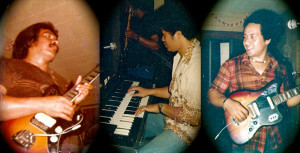
Perhaps the most important advice Dad gave us was to “play with feeling”. I recall being called out once for just mechanically strumming the chords, meaning, without feeling. That was never to happen again! “Jazz is a feeling” he said, “not just a bunch of chords!”. We developed good ears for chords and were able to pick them up from the radio and records. On jazz improvisation Dad explained it like “thinking of the melody line while playing another”. He was quite the task master and it was hard going at the start.
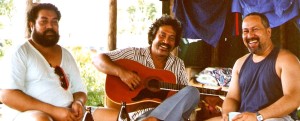
However, it became easier over time through practice, in addition to regular public appearances; at the gigs you simply had to obey the unwritten rule of “live” performance. You just did it, hoping for the least number of blue notes, either vocally or instrumentally, or both. We grew up to truly appreciate what Dad was saying. It certainly put us on a good musical footing for life. Dad led the band for many years before deciding to let us continue while he managed the Moonglow and Le Tanoa nightclubs.
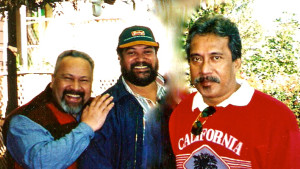
He would then occasionally join in for the odd jam session or gig. The Miller Band, as it was called then, continued after Dad “retired”, until it disbanded in the early ‘80s. During our band years we were often asked about writing our own songs and recording them. The notion seemed ridiculous and irrelevant at the time, and it never happened. It was not until the Willie Miller CD was finally completed in 2012 that I began to gain some confidence in producing music CDs “do-it-yourself” style, using old audio files. So then, “Why not do a Miller brothers CD using the remainder of the old stuff that has the three of us playing?”.
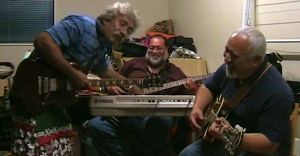
The result was the first Miller Brothers CD, which was simply called Play. Like the Willie Miller CD, Play is a rearrangement of numbers recovered from old cassette tapes and the stereo CD from the 2005 attempt. But unlike the Willie Miller CD the opportunity arose to include one or two numbers from later jam sessions, a luxury we didn’t have when doing Dad’s CD. The first track on Play is a cover of Black Sand, a composition by that funky Hawaiian jazz-rock group Kalapana, from 1978, during the Moonglow days. The band line-up then was Harry and Latu on guitars, Maua on keyboard, Pili Fuiono Fa’ai’uaso on bass, and Richard “Pisi” Stanley on drums.

As Time Goes By is a studio jam session captured during the making of a friend’s CD in 1997 at Montage Studio, Auckland. You can hear Maua emulating Dad’s tenor sax on keyboards! Our covers of the jazz standards Caravan, Night and Day, Poinciana, Moonglow, and How High The Moon came from the abandoned 2005 guide tracks that were meant for the Willie Miller CD. I cleaned them up a little and added some drums, keyboards, and strings. Hopefully we did them justice, emulating Dad’s chord progressions and feel.

Our version of Samba de Orpheu is typical of how we bonded throughout our adult lives, sitting around with guitar/s in hand where possible, and jamming away on anything and everything. This track was captured directly onto a laptop in Latu’s garage in Auckland 2007. It is a raw guitar trio jam session with no added embellishments. Harry leads off the melody on a Gibson SG on left pan, me on an Ibanez GB10 with bass/rhythm in centre pan, and Maua filling in on a nylon acoustic on right pan. Maua then takes first chorus, followed by me on right pan while Maua plays bass on nylon acoustic in centre pan. Finally, Harry leads out.

Leimomi is a Hawaiian tune extracted from a video capture of the 2011 fundraising charity concert at the Orator Hotel in Apia, September 2011 for the Mapu-I-Fagalele rest home. The line-up for the gig was Harry and myself on guitars, Maua on keys and bass, Frank Elia on drums, and friends Mac Laban, Oliva Va’ai, and Deacon Eves taking turns on bass. The last track on Play is an instrumental arrangement of Billie Nelson’s It Is Only A Memory. Dad was supposed to have recorded lead vocals at the abandoned 2005 attempt.

As far as we know this is the first time the Introduction or Verse of It Is Only A Memory has been voiced or recorded, thanks to a torn and tattered copy of the original manuscript that was in Dad’s “shed”. That melody part is played by Maua on piano. Like the Willie Miller CD the feel of Play is one of a casual live improvisation session rather than a planned CD project in the making. We feel eternally grateful to him for his gift of music. While he was certainly a pioneer of Jazz in Samoa, Dad could conceivably be the first Samoan ever, to not only have introduced Jazz to Samoa, but to also continue practising this art form to the end.
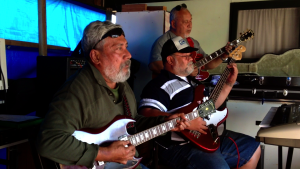
Looking at Dad objectively and not through the eyes of a son, I see Dad as a very gifted virtuoso with incredible musical talent. He was a multi-instrumentalist with a unique sense of harmony and timing, and a proponent of a very tricky genre in the musical art form. And all of this was learned through determination and intuition. Such is the legacy of Jazz left to us by our father, Tuiafelolo Maiava Willie Miller.
Click on the YouTube links below to watch, hear, or download the tracks from our CD Play.
1. Black Sand (Kalapana)
2. As Time Goes By (Herman Hupfeld)
3. Poinciana (Buddy Bernier & Nat Simon)
4. Samba De Orpheu (Luiz Bonfa)
5. Moonglow (Will Hudson & Irving Mills)
6. So Danco Samba (Antonio Carlos Jobim)
7. Night & Day (Cole Porter)
8. Caravan (Juan Tizol)
9. Lei Momi (Hawaiian traditional standard)
10. How High The Moon (Nancy Hamilton & Morgan Lewis)
11. It Is Only A Memory (Billie Nelson)
